Here's my grandmother's recipe for mutton pulao or yakhni pulao. A delicate pilaf prepared in a gently spiced bone broth that she would serve every Eid.
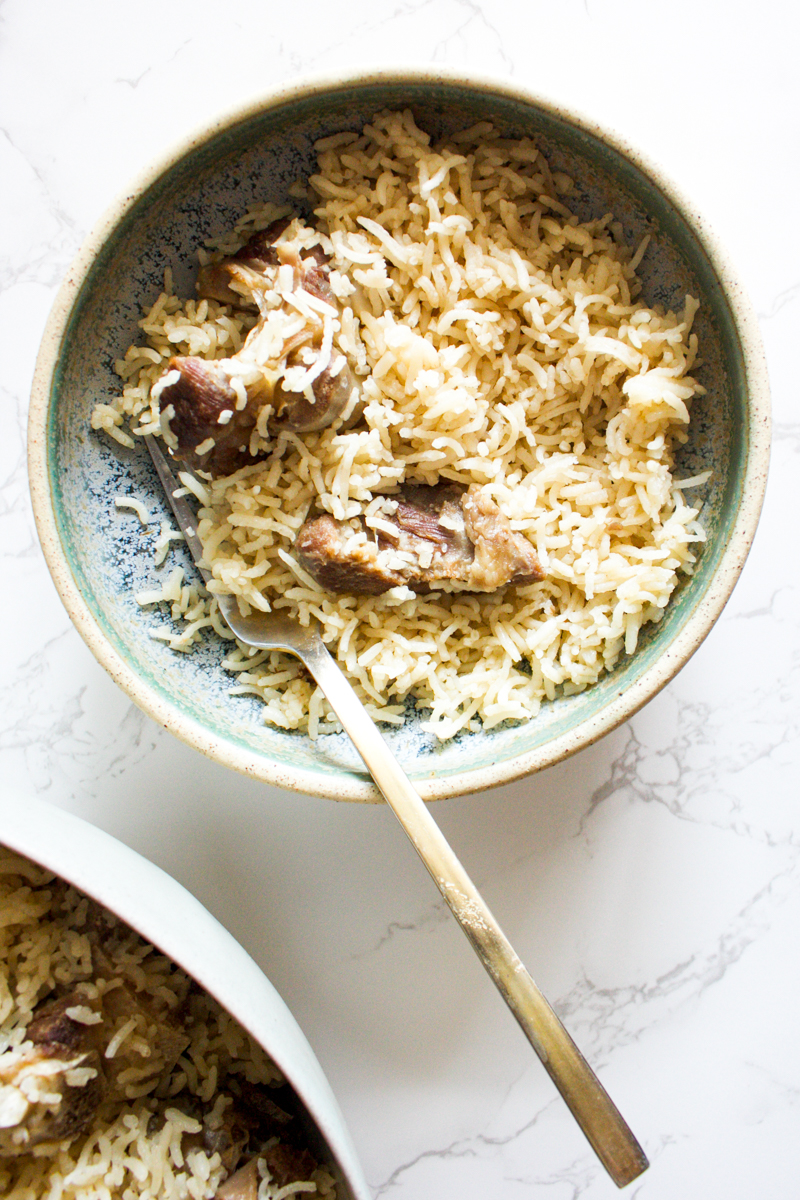
This post was originally published on August 29, 2017. The recipe accompanies an essay I wrote a few months after the election of Donald Trump.
It was the night after the 2016 U.S. presidential election that I was seated around the dinner table with Palestinian, Syrian, and Yemeni friends, interspersing laughter and tears over a plate of delicately flavored Yemeni pulao. It was different from my grandmother’s Pakistani mutton version but comforting just the same.
Mutton pulao is a quiet dish that dutifully appeared on my grandmother’s table during Eid. While my family never sacrificed a goat as is custom in Muslim countries during Eid ul-Azha, we always enjoyed it in the form of mutton pulao alongside cilantro and mint chutney, curried spinach, eggplant infused yogurt (baingan ki borani), and meat curry (“korma”).
In appearance and taste, pulao can appear simple but those who cook it well know that its complexity comes from a gentle touch perfected over decades of practice. I would often think of mutton pulao when I moved to Washington D.C. from Pakistan in 2010. It was the year that my grandmother, Mommy, passed away. She was my last living grandparent, and, with her, I felt she took the last strain of history from a modern family with little patience for tradition.
In her time Mommy too was modern. But she also came from a long line of storytellers. Her siblings and her (nine in total) were master orators. Through decades of narrating family’s stories, they created among their grandchildren an understanding of history that was embedded in personal experience.
In my immediate family’s case, that included American history. My grandparents had moved to Hyde Park in Chicago during the 1950s while my grandfather was getting his Ph.D. While his recollection of Chicago would center around how he was able to complete his Ph.D. in three years, Mommy would speak of her time in the U.S. with a strain of anger. She would always say, “Remember in America, you will always be a second-class citizen”.
Until the night of the 2016 election, I never bothered to reflect on why she said that, repeatedly. Maybe it was because she had once casually mentioned how my father was born in a hospital where they kept “white” babies separate from African-American babies. Or occasionally rant, “how dare they think we are dirty.”
Maybe while my grandfather’s head was buried in books, Mommy was witnessing casual racism as she carted my father down in a stroller in leafy Hyde Park. She noticed the deeply segregated neighborhoods; overhead snide remarks about Muslims; struggled with orientalist commentary on why South Asians insisted on eating with their dirty hands.
Growing up, Mommy’s stories seemed outdated. Her paranoia, misplaced. Like your typical white collar immigrant, I was naïve and optimistic about the arc of American progress. The results of the election, and now the events at Charlottesville have brought back Mommy’s words. Maybe I am not welcome here.
Seeing my distress on November 9, my Yemeni colleague invited me over for dinner the where she had prepared her country’s version of pulao: beautifully prepared cumin-spiced rice topped with almonds. As the Palestinian, Pakistani, Syrian, and Yemeni laughed and cried about the election results in disbelief, we reminded ourselves that we had seen worse, and that we will overcome.
By the end of the night, I could not help but smile. Maybe there was something to Clinton’s words when he said nothing wrong with America could not be cured by what was right with America. To me, that dinner was everything that was right with America. And of course, everything that was right with pulao.
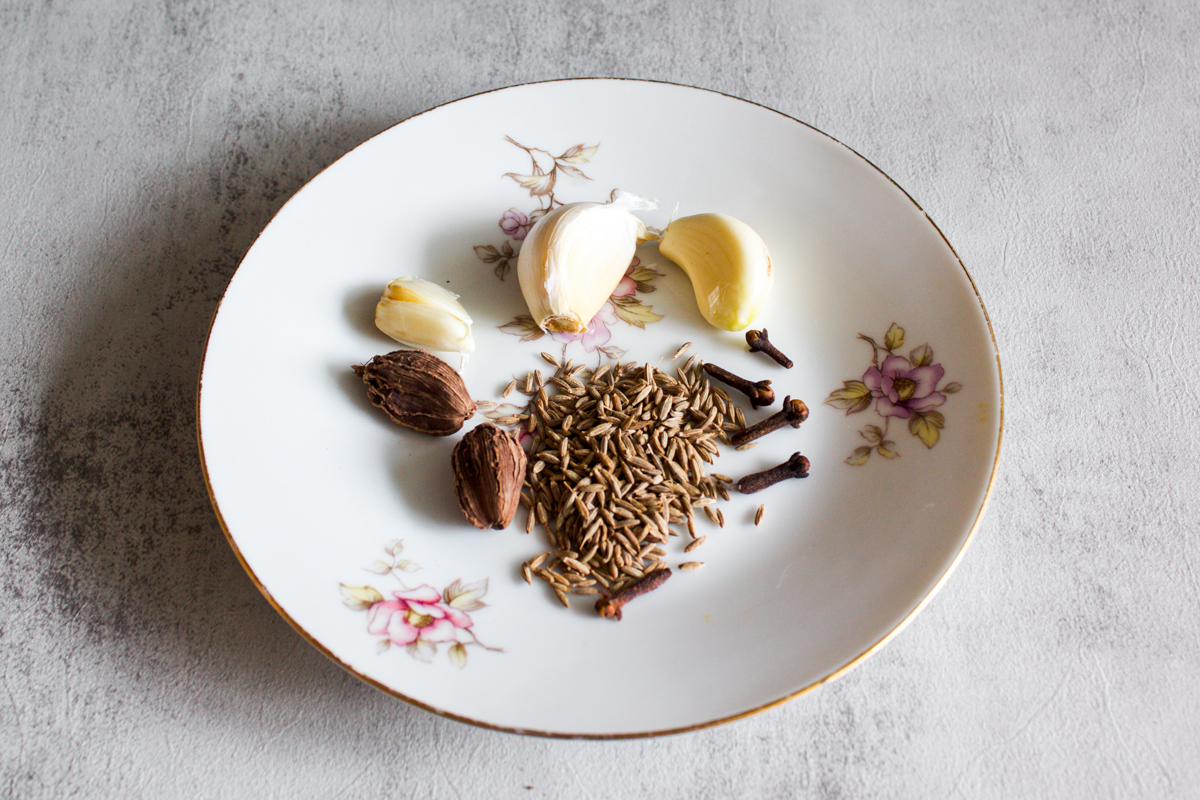
Ingredients
- Mutton: In my home, we refer to goat as mutton. But if I can't find goat, I often swap it out for lamb. It's a matter of personal preference and family tradition - either works!
- Onions: Which type? Traditionally, my grandmother used red onion to prepare pulao. You can however, use yellow onion as well.
- Black cardamom: It helps temper the smell of red meat, and imparts the broth with a smoky flavor. If you don't have black cardamom, don't swap it out for green cardamom (they are very different). Just leave it out if you can't find it in your pantry.
- Cloves: Use whole cloves, don't substitute them with clove powder.
- Cinnamon stick: Again, use whole cinnamon, don't substitute it with cinnamon powder.
- Cumin seeds
- Crushed garlic: You can buy this at the store or just crush it yourself using a food processor or mortar and pestle.
- Salt: I would recommend using regular kosher salt here. I used roughly 2 tablespoon salt but I encourage you to check for salt as you go along.
- Neutral oil: I normally use canola oil but sunflower or vegetable oil works well too.
- Basmati rice washed in several changes of water and preferably soaked overnight
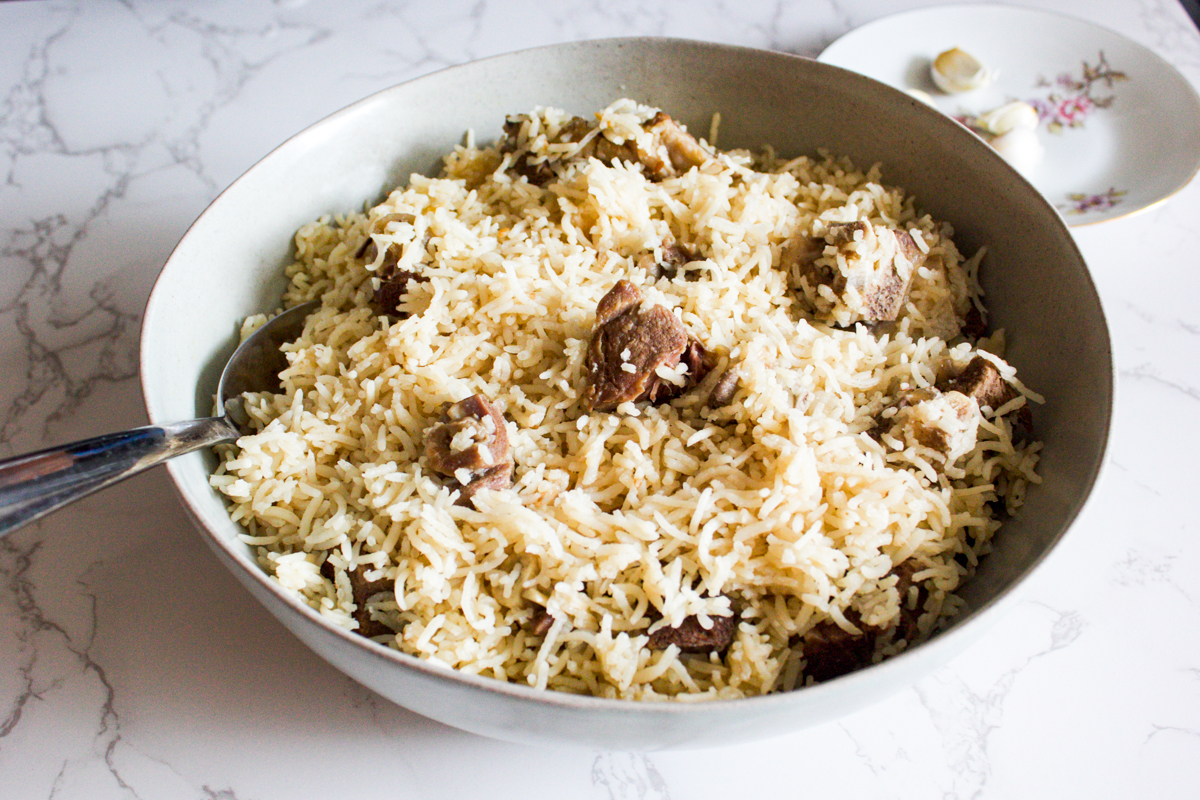
What to Serve with It
- A chutney of your choice: You can serve a green chutney, such as this mint one or a heftier cilantro and tomato-based one. If you are looking for something spicier, check out this garlic variation.
- Raita: Again, you have options! My grandmother would typically serve eggplant with yogurt (dahi baingan) but if you are looking for something quicker, try this cucumber raita.
- Kebabs: You have to serve kebabs with pulao, preferably beef. If you are up for the adventure, make a batch of shami kebabs. If you are looking for a recipe that's quick and satisfying, check out these ground beef kebabs.
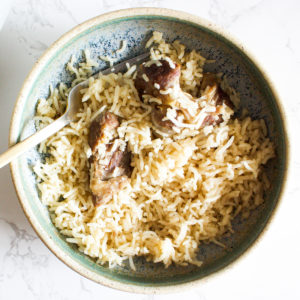
Mutton Pulao Recipe
Equipment
- Heavy bottom pot
Ingredients
- 3 pounds (~ 1 ½ kilogram) mutton washed, trimmed, and cut in small pieces
- 4 medium-sized yellow or red onions thinly sliced in half rings
- 2 black cardamom
- 4 cloves
- 2- inch cinnamon stick
- 1 tablespoon cumin seeds
- 2 tablespoons crushed garlic
- 2 tablespoons salt or to taste
- ⅓ cup neutral oil canola/sunflower/vegetable
- 3 cups basmati rice washed in several changes of water and preferably soaked overnight
Instructions
- Add meat in a large pot of salted water (I add 1 tablespoon of salt at this stage) with black cardamom, cloves, cinnamon stick, cumin seeds, 2 sliced onions, and 1 tablespoon of crushed garlic. Bring to boil, cover pot and simmer on low heat until mutton is tender, about 1 ½ to 2 hours.
- Once the meat is tenderized, remove the meat with a slotted spoon, and set aside.
- Strain the bone broth, and set aside.
- In a large pot, heat oil. Once the oil begins to shimmer, add the remaining sliced onion, and fry for about 15 minutes on medium-low heat or until a deep golden brown.
- Add crushed garlic, and fry for roughly 30 seconds or until fragrant.
- Add the mutton, salt, and fry for 8-10 minutes on medium-high heat.
- Add 6 cups of the strained mutton broth to the pot. Check for salt, and bring to a boil. You can put the leftover of the broth in airtight containers, and freeze for later use.
- Add rice, and let the water boil out, about 10 minutes.
- Once the water boils out, wrap lid with a clean kitchen towel and place it securely on the pot. Let rice steam on very low heat for 10 minutes.
- Place pulao on serving platter and fluff with a fork.

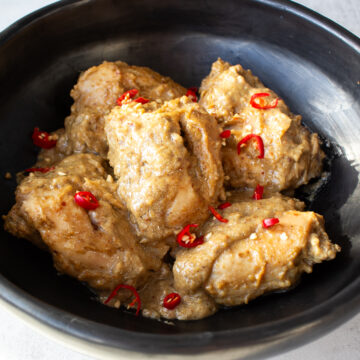
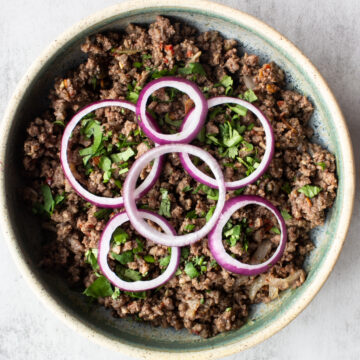
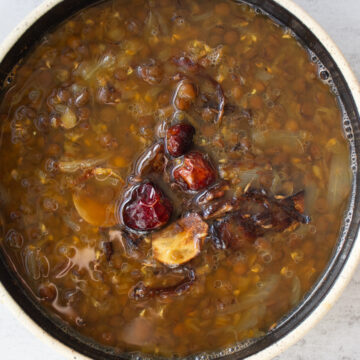
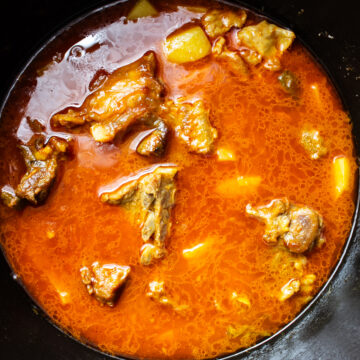
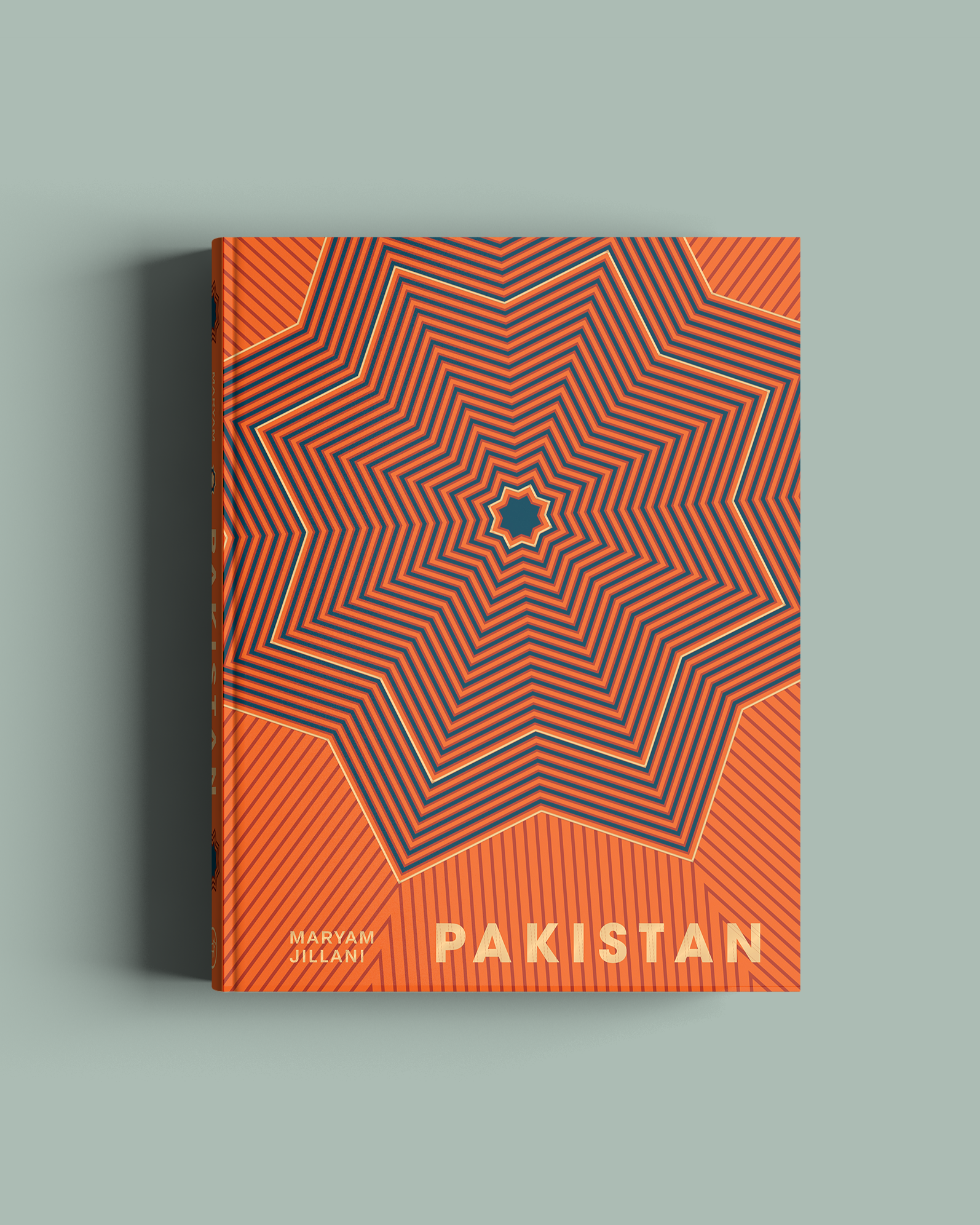
Izz C says
I am extremely happy to run across your blog. Your writing, your point of view, your vision and purpose..absolutely beautiful! I admire your cause and hope to do the same. I have a thirst to learn, document and the pass on the authentic ways of our ancestors. Thank you and looking forward to more!
Izz | teaforturmeric.com
Maryam Jillani says
Hi Izz - thank you so much for your kind words, and for reaching out! Your blog looks fantastic, and I'm looking forward to learning from you as well! Here's to raising the flag for Pakistani cuisine!
Kathryn says
This post is so beautifully written, and what a perfect dish to offer hope and comfort.
mobile legends mod says
Wonderful post! We are linking to this great content on our website.
Keep up the good writing.
Behealthis says
Throwing a party? This all-Punjabi menu, featuring Mutton Pulao and Palak Gosht, is sure to be a hit
Valentina Haq says
It seems easy to follow with simple ingredients (masala). I will try to make and hope it turns out as delicious as I think it will. Thanks for sharing the recipe !!
pakistaneats says
So happy to hear! Let me know how it goes and if you have any feedback on the recipe.
Danda says
Made the mutton pulao,mummy’s style.Was out of the world.Will ask my mummy to also try it.
pakistaneats says
This makes me so happy!! Thank you so much for leaving a nice note.
Mohammad Siddiqui says
Hi Maryam,
I see that is a mutton recipe. I'm in the states and mutton is typically referred to as lamb here. I know in Pakistan/India mutton can also mean goat. Which do you recommend here?
pakistaneats says
Thank you for reading! Back in Islamabad, we typically make it with goat but when I'm in the US, I swap it with lamb since it's more readily available. Both work well but my personal preference is goat. Hope this helps!
Samina says
I make this recipe all the time, and love it!